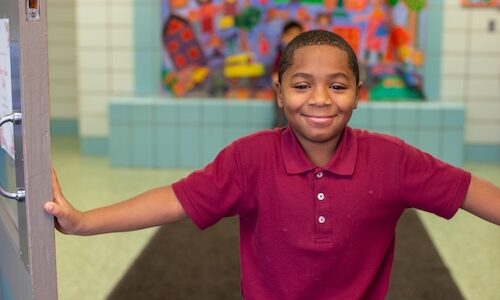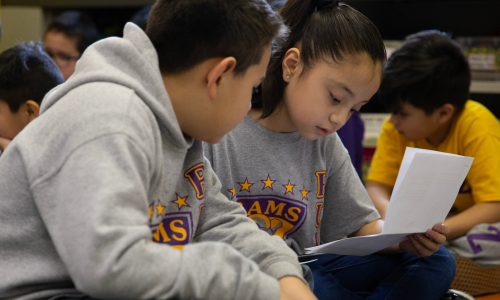
You’ve read it before, seen the research, heard the podcasts: laughter is good for you! According to some recent research, it’s not only good for you physically but also for your mental and emotional well-being.
What have you done with this information? If you are like me, maybe you’ve ignored it, doing nothing more than filing it in the “stuff that is good for us” section of your brain. Well, at my school, we are not ignoring it any longer, thanks to one of our sixth-grade students.
How we learned to laugh more
At our school, we have announcements each morning. This includes a personalized, live school song written and sung by the music teacher, some student announcers (all are welcome to sign up), plus words from some teachers and me, our school principal. It’s quite a production and a sacred tradition. All during the pandemic, when our buildings were closed, we recorded the announcements and pushed them out to our Google Classrooms.
It’s all been good stuff over the years, but after a while, we fell into a bit of a rut of the same old stuff. Until this year and one spark of an idea.
One random school day last fall, I was approached by a student who asked, “Can I rewrite the script we use for the announcements to include a joke-of-the-day section?” Alarm bells went off in my head: “Jokes? What if they aren’t funny? Appropriate? Kind?” But on the outside, I said, “Hmmm… What would that look like?” Our conversation expanded to how the jokes would be submitted to the office ahead of time. The student and I agreed that not all jokes would be read if they weren’t appropriate, and that we should also include fun facts, as “Kids like those, too, Mrs. Fowler.”
[W]e were all thinking about ways to laugh more and have fun.
In no time at all, three students had spent their recess writing down all the jokes they could think of. They submitted them to me and I read one each day during announcements. By the end of the week, I had received about 50 more jokes. Word was spreading that students could submit jokes, and I requested them, along with fun facts, before signing off every morning. One student even lent me his joke book for the year, saying, “I think you need more help being funny so you can borrow this for as long as you want.” Ha!
Laugher is contagious
As this new joke protocol gained ground, what I didn’t expect was that I’d start receiving jokes and fun facts from staff. It became evident we were all thinking about ways to laugh more and have fun. It’s been a tough year. We’ve all had to reach in and find our “invincible summer,” that place Albert Camus was talking about. Laughter has helped us do that. The best times are when I crack up the announcement team in the office and we can’t finish our closing remarks without giggles.
Just recently, I added a section into my school board report about the joke of the day and included some jokes. It was great to watch our board members on our live stream reading our jokes out loud and chuckling during the meeting. I like to think our students helped lighten their load by infusing some fun into the serious work of running a school.
When I work with groups of educators now, I often start with or insert a joke to keep the learning fun. During one of my sessions, I even had participants writing jokes in the chat (which, of course, I kept and added to our school bank).
End this hard year with giggles
Are you looking for more laughter? I encourage you to try something like a joke of the day during your morning announcements, or at least at your recurring meetings. Here are some to get you started:
- Why did the cookie go to the nurse? Cuz it felt crumby!
- What kind of tea cannot be taken into space? Gra vi tea!
- I could tell you a joke about pizza but it’s a bit cheesy.
- How does Darth Vader like his toast? On the dark side.
- What did the snowman have for breakfast? Frosted Flakes.
- Where do bad rainbows go? To prism, of course, but it’s a light sentence.
For some fun facts, check out “Fun facts and trivia,” “101 fun facts for kids that will blow their minds,” and “170 fun facts for kids—weird but true.”
When you add a bit more humor to your life, you won’t be disappointed with the results, and every day you’ll get to do that thing that’s good for you: laugh. It will help you start your day off in just the right way.







